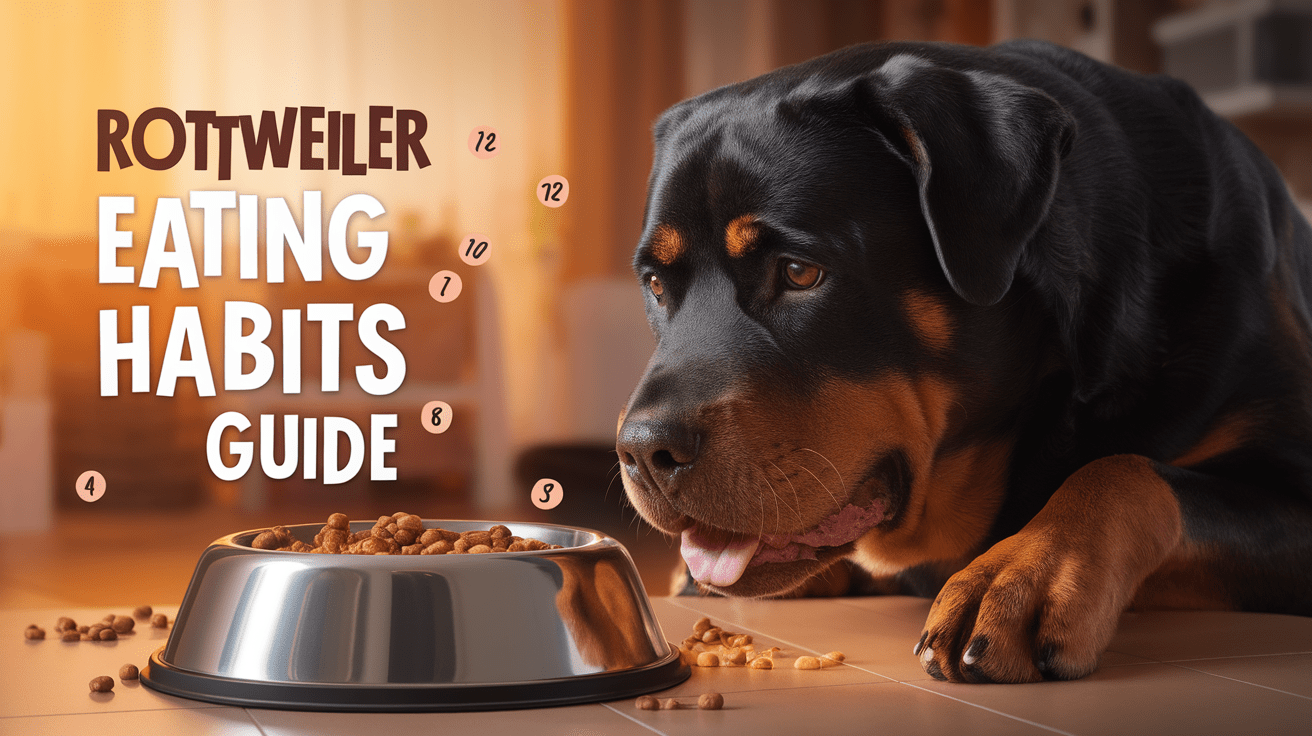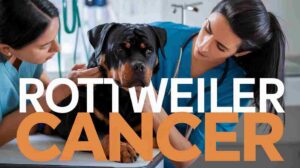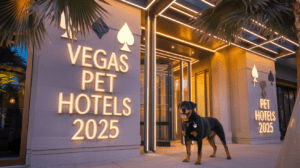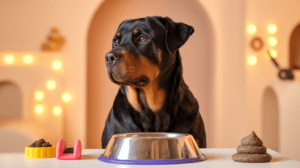Why is my Rottweiler eating so much? Key Takeaways
- ✓ Normal Portions: Adult Rottweilers typically need 4-8 cups of quality dry food daily, divided into two meals, while puppies require 3-4 meals per day.
- ✓ Medical Causes: Sudden increased appetite could indicate conditions like diabetes, hyperthyroidism, or intestinal parasites that require veterinary attention.
- ✓ Behavioral Factors: Growth spurts, increased exercise, stress, or poor-quality food can all contribute to increased appetite in Rottweilers.
- ✓ Management Strategy: Establish consistent feeding schedules, use appropriate portion control, and choose high-quality food to maintain healthy eating habits.
If your Rottweiler’s excessive eating habits persist, it may lead to obesity – a serious health concern. Check out our comprehensive guide on helping your Rottweiler lose weight effectively to prevent dangerous complications.
Is your Rottweiler suddenly eating like there’s no tomorrow? As a veterinarian and Rottweiler owner for over 15 years, I’ve seen my fair share of food-obsessed Rotties, including my own gentle giant, Max. According to a recent AVMA study, nearly 60% of dogs in the US are overweight, making it crucial to understand your Rottweiler’s appetite changes.
While these powerful pups naturally have hearty appetites, a sudden increase in food consumption might signal underlying issues that need attention. Whether it’s a growing puppy’s growth spurt or potential medical concerns, understanding why your Rottweiler is eating more than usual is essential for their health and well-being. Let’s dive into the reasons behind your Rottie’s increased appetite and discover practical solutions to manage their eating habits effectively.
Normal Eating Habits vs. Excessive Eating in Rottweilers
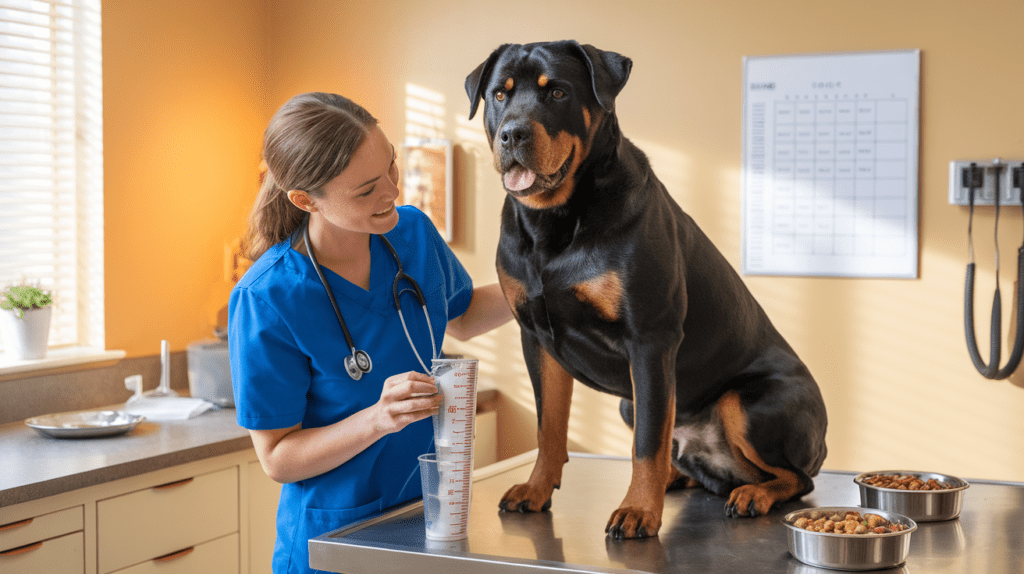
During my veterinary practice, I’ve noticed that understanding normal food consumption patterns in Rottweilers can be tricky for many owners. My own Rottweiler, Max, helped me learn that what seems like overfeeding might actually be normal for these muscular dogs.
Typical Portion Sizes for Rottweilers by Age
Rottweiler puppies typically need 3-4 meals per day, while adult Rottweilers usually do well with 2 daily meals. According to a study by the AKC Canine Health Foundation, adult Rottweilers generally require between 4-8 cups of high-quality dry food daily, depending on their activity level and size.
Signs of Overeating in Rottweilers
While Rottweilers have naturally healthy appetites, certain behaviors indicate excessive eating:
• Rapid weight gain over short periods
• Difficulty breathing after meals
• Constant begging for food
• Stealing food or getting into garbage
• Visible obesity where ribs aren’t easily felt
Daily Food Requirements
As a rule of thumb, I recommend following the “”40-30-30 rule“” for adult Rottweilers: 40% of calories in the morning, 30% mid-day (if feeding three times), and 30% in the evening. For a typical adult Rottweiler weighing 100 pounds, this translates to approximately:
• Morning: 2-3 cups of quality kibble
• Afternoon: 1.5-2 cups (optional)
• Evening: 1.5-2 cups
Keep in mind that these are general guidelines. Just like my Max needed adjustments to his portions during high-activity periods, your Rottweiler’s needs may vary based on age, activity level, and overall health condition. When in doubt about portion sizes, it’s always better to consult with your veterinarian for personalized recommendations.
Common Reasons for Increased Appetite in Rottweilers
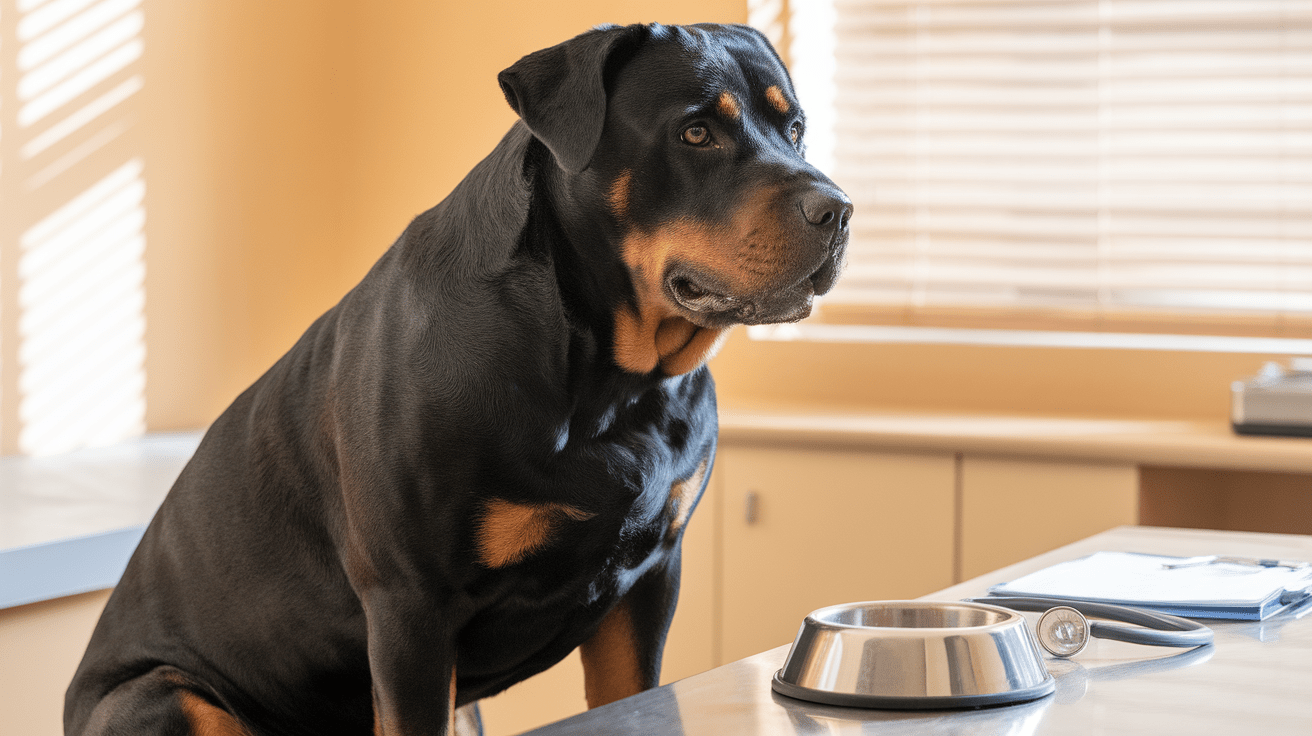
During my years of practice, I’ve observed that increased appetite in Rottweilers can stem from various causes, both medical and behavioral. According to a UC Davis Veterinary Medicine study, approximately 25% of sudden appetite changes in large breed dogs are linked to underlying medical conditions.
Medical Causes
When my Rottweiler Max suddenly started devouring his food bowl in record time, it prompted me to investigate potential medical causes. Several health conditions can trigger increased appetite:
Diabetes: Just like humans, diabetic Rottweilers often experience intense hunger due to their body’s inability to properly use glucose. Watch for increased thirst and frequent urination alongside increased appetite.
Hyperthyroidism: Though less common in dogs than cats, this condition speeds up metabolism, causing your Rottie to feel constantly hungry. You might notice weight loss despite increased food intake.
Intestinal parasites can cause your Rottweiler to eat more while actually losing weight. These unwanted guests steal nutrients from your dog’s digestive system, leading to constant hunger.
Cushing’s disease, which I’ve seen particularly in older Rottweilers, increases cortisol levels and can cause excessive hunger along with increased thirst and a pot-bellied appearance.
Behavioral and Environmental Factors
Sometimes, the reason for increased appetite is more straightforward:
• Growth spurts: Particularly in puppies between 4-7 months old, when their energy needs skyrocket
• Exercise changes: A more active lifestyle naturally requires more calories – I saw this with Max when we started agility training
• Stress or anxiety: Some Rottweilers respond to emotional challenges by overeating
• Poor quality food: Low-nutrient foods might leave your Rottie feeling constantly hungry
If you notice your Rottweiler’s appetite increasing suddenly, it’s important to consider recent changes in their routine or environment before assuming it’s a medical issue. However, when in doubt, it’s always better to consult with your veterinarian for a proper evaluation.
Managing Your Rottweiler’s Eating Habits
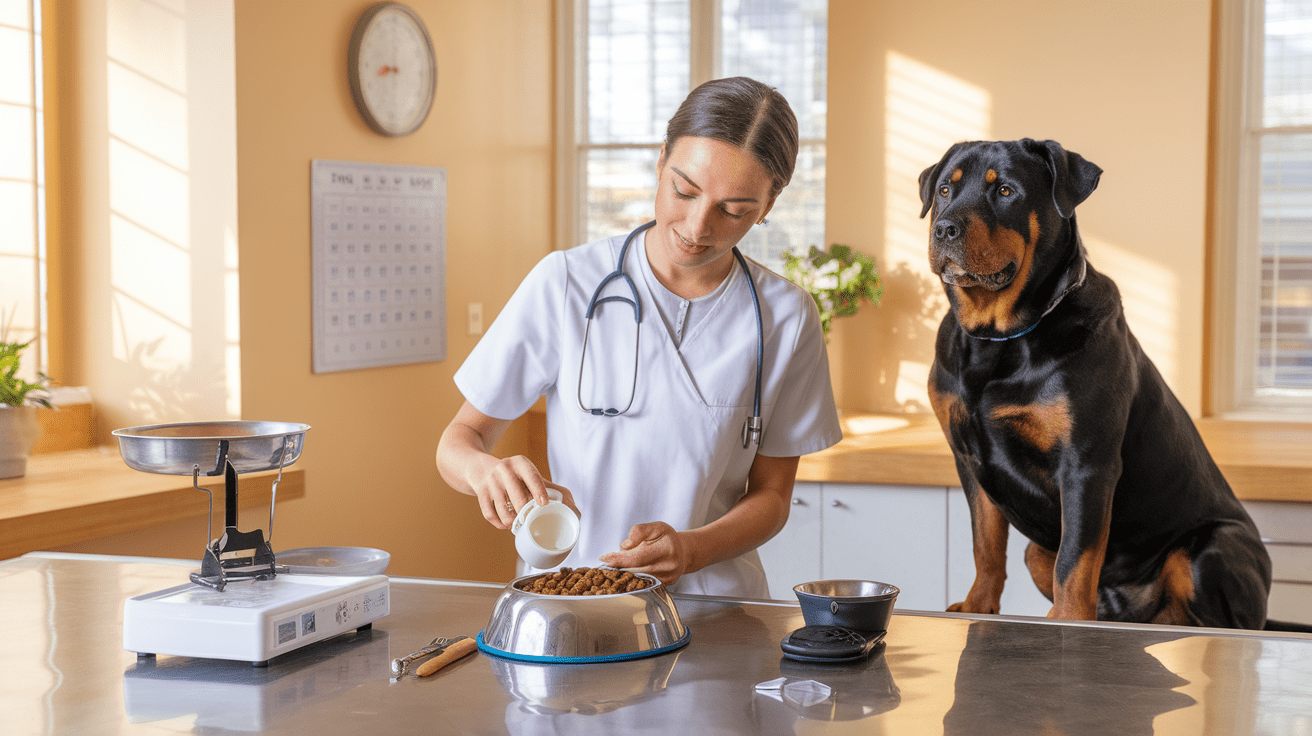
Solutions and Prevention
Establishing feeding schedules is crucial for maintaining healthy eating habits. Just like when I trained Max to eat at specific times, consistency helps regulate your Rottweiler’s metabolism and prevents excessive hunger. I recommend:
• Set meal times 12 hours apart
• Remove uneaten food after 20 minutes
• Avoid free-feeding practices
• Keep a feeding log to track patterns
Choosing appropriate food types makes a significant difference. Think of it like fueling a high-performance car – your Rottweiler needs the right type of fuel to function optimally. Look for:
• High-quality protein sources as the first ingredient
• Appropriate fat-to-protein ratios
• Limited fillers and artificial preservatives
• Age-specific formulations
Portion control methods that I’ve found effective include:
• Using measured cups or a kitchen scale
• Investing in automated feeders for consistent portions
• Utilizing slow-feed bowls to prevent gulping
• Dividing daily portions into smaller, more frequent meals
When to consult a veterinarian is a common question I receive. Contact your vet if you notice:
• Sudden changes in appetite lasting more than 48 hours
• Weight gain despite portion control
• Excessive thirst alongside increased appetite
• Behavioral changes during feeding times
Remember, just as I discovered with Max, each Rottweiler is unique. What works for one might not work for another. The key is to observe your dog’s response to different management strategies and adjust accordingly. Patience and consistency are your best allies in establishing healthy eating habits for your Rottweiler.
Frequently Asked Questions About Rottweiler Eating Habits
Excessive hunger in Rottweilers can be due to several reasons: a growth spurt if they’re puppies, increased physical activity, parasites, or medical conditions like diabetes or thyroid issues. It’s also possible they’re not getting enough nutrients from their current food, or they might be experiencing psychological factors like boredom or anxiety.
Adult Rottweilers typically need 4-10 cups of high-quality dog food daily, divided into 2-3 meals, depending on their size, age, and activity level. Adult males (85-135 lbs) usually require more food than females (75-110 lbs). Puppies need 3-4 smaller meals daily with amounts based on their age and growth stage.
Yes, sudden increased appetite could indicate medical conditions such as diabetes, hyperthyroidism, Cushing’s disease, or intestinal parasites. If your Rottweiler’s eating habits have changed dramatically and are accompanied by other symptoms like weight loss, lethargy, or changes in behavior, consult your veterinarian.
To control excessive eating: establish a regular feeding schedule, measure portions accurately, use slow-feeder bowls, ensure they’re getting high-quality protein-rich food, increase exercise, and avoid free-feeding. Also, provide mental stimulation through toys and training to prevent boredom-related eating.
Frequently Asked Questions About Rottweiler Eating Habits
Excessive hunger in Rottweilers can be due to several reasons: a growth spurt if they’re puppies, increased physical activity, parasites, or medical conditions like diabetes or thyroid issues. It’s also possible they’re not getting enough nutrients from their current food, or they might be experiencing psychological factors like boredom or anxiety.
Adult Rottweilers typically need 4-10 cups of high-quality dog food daily, divided into 2-3 meals, depending on their size, age, and activity level. Adult males (85-135 lbs) usually require more food than females (75-110 lbs). Puppies need 3-4 smaller meals daily with amounts based on their age and growth stage.
Yes, sudden increased appetite could indicate medical conditions such as diabetes, hyperthyroidism, Cushing’s disease, or intestinal parasites. If your Rottweiler’s eating habits have changed dramatically and are accompanied by other symptoms like weight loss, lethargy, or changes in behavior, consult your veterinarian.
To control excessive eating: establish a regular feeding schedule, measure portions accurately, use slow-feeder bowls, ensure they’re getting high-quality protein-rich food, increase exercise, and avoid free-feeding. Also, provide mental stimulation through toys and training to prevent boredom-related eating.
Final Thoughts
Understanding and managing your Rottweiler’s eating habits is crucial for their overall health and longevity. Through my experience both as a veterinarian and Rottweiler owner, I’ve learned that sudden appetite changes should never be ignored. While some causes might be as simple as a growth spurt or increased activity, others may signal underlying health issues requiring professional attention. Remember that establishing consistent feeding routines and providing high-quality nutrition are key to maintaining healthy eating patterns. If you notice significant changes in your Rottie’s appetite, don’t hesitate to consult with your veterinarian. With proper attention to their nutritional needs and eating behaviors, you can help ensure your Rottweiler maintains a healthy relationship with food throughout their life.
Understanding your Rottweiler’s eating habits is just one aspect of maintaining their overall health. For a comprehensive overview of health concerns and preventative measures, check out our detailed Rottweiler Health 101: A Guide to Common Issues & Preventative Care. This resource covers everything from genetic predispositions to preventative care strategies, helping you ensure your Rottweiler stays healthy and happy throughout their life.


